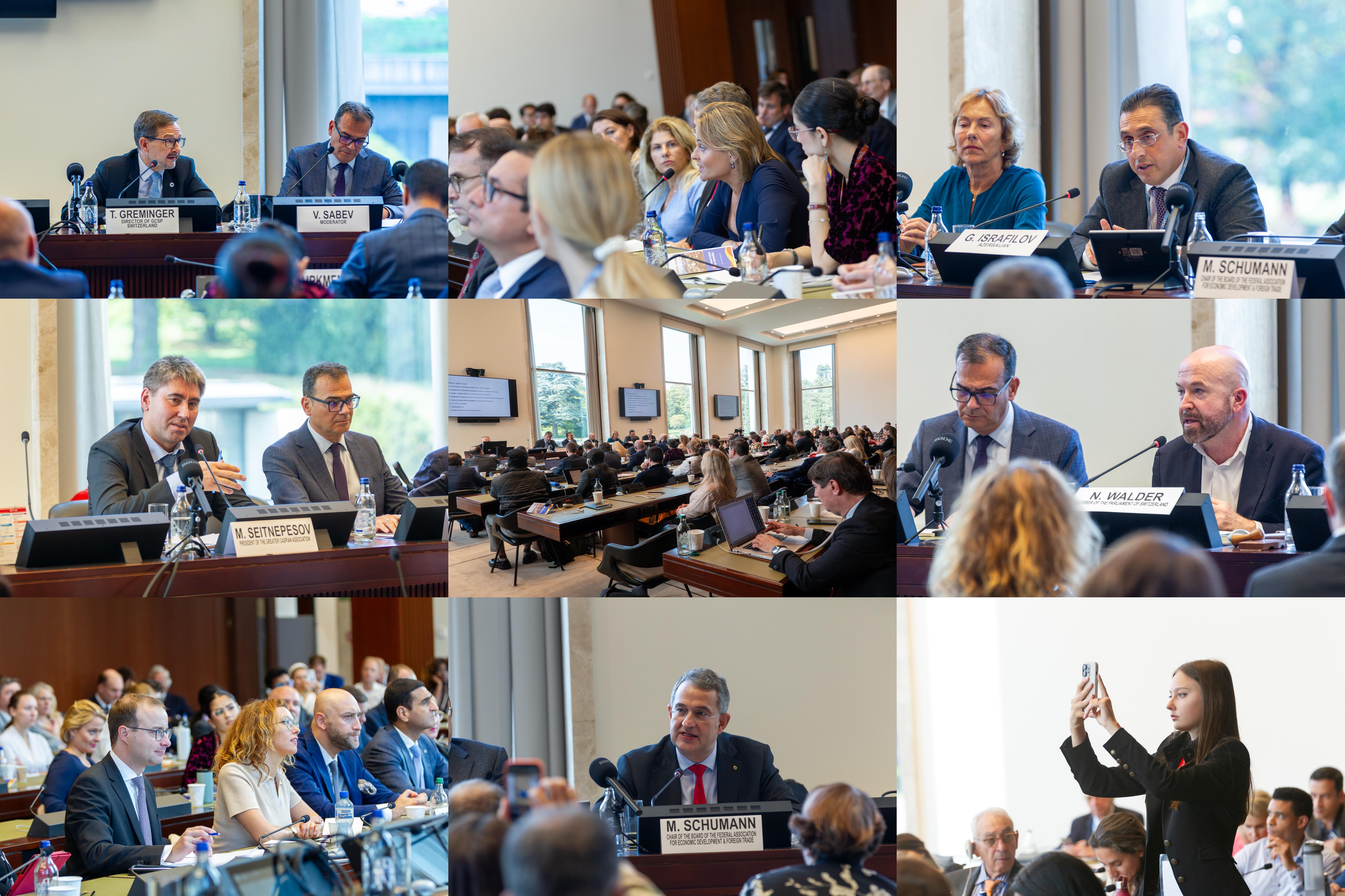
The United Nations in Geneva hosted the international forum “War, Peace and Neutrality” on October 10, where more then 300 diplomats, academics, politicians, think tanks experts and representative of business world discussed the role of neutrality today. It was organised by the Geneva Center for Neutrality, the Permanent Mission of Turkmenistan at the UN and the Greater Caspian Association. At the second session “Neutrality, business, and strategic assets” panellists debated on neutrality not only as a diplomatic principle, but also as strategic economic instrument shaping trade, investment, and long-term stability.
Opening the session Ambassador Thomas Greminger, Director of the Geneva Centre for Security Policy (GCSP) and former OSCE Secretary General, framed neutrality as a tool for bridge-building rather than silence: “In a polarized and fragmented world, neutral countries can play an outsize role in promoting dialogue, uphold international law and human rights, and support peace processes”. Greminger urged “positive or constructive neutrality,” noting that a UN General Assembly resolution in March 2025 on Turkmenistan’s permanent neutrality explicitly encourages neutral territories to host peace talks and mediation mechanisms.
Neutrality 3.0 or three-stages evolution
Ambassador Olga Algayerova, Slovakia’s Permanent Representative to the Council of Europe and former head of the UN Economic Commission for Europe, proposed a vision of the three-stages evolution: “Neutrality 1.0” - non-participation in wars, “Neutrality 2.0” - active diplomacy and confidence-building, and “Neutrality 3.0” - economic and digital neutrality. “Energy and the environment should not be misused for political purposes,” - she said, arguing neutral states can be “trusted hubs” for AI governance, tokenized money and cross-border digital trade.
Algayerova went further, urging governments to consider Bitcoin as a strategic reserve asset. With “a maximum supply of 21 million” and “19.9 million mined by October 2025,” she said, selective state adoption is emerging, citing El Salvador and a U.S. proposal for a 1-million-Bitcoin reserve. Her prescription: “enhance regulatory clarity,” scale tokenized money, invest in digital skills and infrastructure, and use neutral jurisdictions to “reinforce trust and prosperity.” Done right, neutral states can host dialogue, set trustworthy digital rules, and modernize financial rails, becoming indispensable bridges in a divided world.
Azerbaijan’s “hybrid” path with elements of neutrality
Ambassador Galib Israfilov, Azerbaijan’s Permanent Representative to the UN in Geneva, described his country’s posture as “a hybrid model”: formally non-aligned, outside any military bloc, and practicing “flexible, balanced, and pragmatic engagement” with the elements of neutrality.
Energy diplomacy, he said, is both “soft power” and a lifeline for partners - from the Southern Gas Corridor to an East-West Trans-Caspian ‘Middle Corridor’ linking Asia and Europe. He highlighted the Organization of Turkic States as a rising platform with positive demographics, rich resources and capabilities, positioning the region as a bridge “connecting Asian and European markets”.
Swiss politician’s argument for “active” neutrality
Swiss National Council member Nicolas Walder, also a candidate for Geneva’s Council of State, pressed for “ethical, active neutrality” grounded in international law. Citing Russia’s invasion of Ukraine and a gridlocked UN Security Council, Walder said neutrality “must not mean being complicit in crimes”. Switzerland, he argued, should adopt sanctions when grave breaches occur, and even gain the legal ability to impose autonomous sanctions where EU or UN measures fall short.
He criticized a far-right initiative for “eternal and absolute neutrality,” that would let Switzerland “do business with everybody»: “It would be illogical to give money with one hand to an aggressor and with the other raise our military budget... Without international law, a small, independent Switzerland has no leverage".
Neutrality as a bridge between worlds
Murat Seitnepesov, President of the Greater Caspian Association argued that neutrality isn’t just a moral stance or legal status - it’s a strategic asset that can turbocharge development, attract investment, and help stitch together a fractured global economy. Drawing on case studies from Switzerland and Turkmenistan, he made the business case for neutrality while pitching neutral states as natural “bridge builders” between East and West, and the Global North and South.
Seitnepesov’s central claim: neutrality pays. Switzerland became a global leader in innovation and prosperity - progress he linked in part to two centuries without entanglement in European wars following recognition of Swiss neutrality. Turning to Central Asia, Seitnepesov cast Turkmenistan as a contemporary parallel. The country’s UN-recognized “permanent neutrality” since 1995, helped it avoid internal strife and the regional conflicts that shook several post-Soviet neighbors, creating a haven of stability. Neutrality, he stressed, can be a platform for channeling investment and de-risking cooperation.
The upshot of Seitnepesov’s intervention was pragmatic: neutrality is an economic development policy as much as a foreign-policy doctrine. It reduces political risk, invites capital, and equips countries to act as trusted intermediaries - the kind of role the global system needs as great-power competition resurges.
Germany’s case for “strategic neutrality” and economic diplomacy
Michael Schumann, Chair of the German Federal Association for Economic Development and Foreign Trade (BWA), proposed “strategic neutrality” as a state of mind rather than a legal status - keeping options open and resisting bloc discipline. “It is not an expression of passivity,” he said, but a choice to diversify, mediate and “avoid becoming an instrument of bloc politics” amid U.S.–China confrontation.
He championed economic diplomacy - firms building trust where officials cannot. Europe, he thinks, can reclaim relevance by mediating and reducing dependencies. On sanctions, Schumann was blunt: his association has been “consistently against” them since 2003 because they “hurt the people” first, citing currency collapse and cost spikes for food, medicine and energy. Small and medium business Schumann called Germany’s true backbone and urged bringing their “broad international horizon” back into policymaking.
The panel “Neutrality, business, and strategic assets” was moderated by Ventzeslav Sabev, Co-Director, Observatory on Security, Geneva University. Raising a hot debate in the audience, topic of neutrality emerged as a safe venues for negotiations by Amb. T. Greminger, digital-era trust anchors and reserves policy by Amb. O. Algayerova, issue-by-issue balancing for connectivity by Amb. G. Israfilov, sanctions-backed impartiality by N. Walder, stability and prosperity assets by M. Seitnepesov, and non-aligned room for economic maneuver by M. Schumann.
The high-level forum “War, Peace, and Neutrality” at the UN in Geneva lasted all day, consisting of three sessions: "Neutrality in the modern world", "Neutrality, business, and strategic assets", and "Neutrality and AI: Security, innovation, governance".
